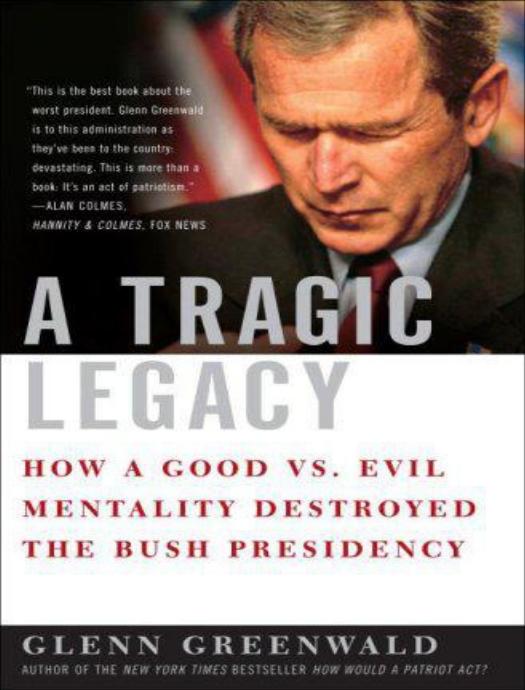A Tragic Legacy: How a Good vs. Evil Mentality Destroyed the Bush Presidency by Glenn Greenwald

Author:Glenn Greenwald
Language: eng
Format: mobi, epub, pdf
Tags: Good and evil - Political aspects - United States, Character, Bush, 21st Century, Political Science, Good and evil, Government, Executive Branch, Political aspects, Political leadership - United States, Current Events, International Relations, United States - 21st Century, Presidents - United States, United States - Politics and government - 2001- - Decision making, United States, George W - Political and social views, George W - Ethics, History, United States - Politics and government - 2001-2009 - Decision making, Political leadership, Presidents & Heads of State, George W - Influence, Presidents, Government - U.S. Government, General, Case studies, Biography & Autobiography, Politics, Government - Executive Branch
ISBN: 9780307354280
Publisher: Random House, Inc.
Published: 2008-04-08T02:22:00.870000+00:00
The Manichean cartoons that overrode virtually all substantive and responsible debate during the Bush presidency obscured a fundamental contradiction at the heart of the president’s approach to the world. Since the 9/11 attacks, the president has insisted upon two fundamentally inconsistent propositions, namely, that (a) we are called upon to spread democracy, because doing so is morally right, consistent with God’s will, and an effective tool for eradicating terrorism, and (b) the imperative of the first proposition is so overwhelming that we pursue it regardless of international objections or world opinion.
Let us stipulate that this second principle is valid—i.e., that if a country is forced to choose between taking measures to protect its citizens or being popular in the world, its leaders have the obligation to choose the former over the latter. If there is but one way that a country can defend itself from external threats, negative world opinion engendered by such a course is an insufficient reason to forgo it. That is true not only for the United States, of course, but for all countries. A government’s first obligation is to protect its citizens from genuine dangers posed by others, not to protect its international reputation. At a very high level of generality, that is all fair enough.
But in the specific case of the moralistic imperatives underlying the Bush worldview of national security, the twin pillars of that approach are plainly, and quite dangerously, in conflict. To spread democracy around the world, while at the same time inflaming anti-Americanism, is the very model of self-defeating behavior.
In December 2006, Venezuela’s president Hugo Chávez was overwhelmingly re-elected. Opposition to the United States played a significant role in his successful campaign. According to the Associated Press account of Chávez’s victory, Chávez repeatedly promised “a more radical version of socialism and [to] forge a wider front against the United States in Latin America.” Chávez is one of the most anti-American leaders on the planet. He made world headlines months earlier when, during a speech before the United Nations and in violation of all diplomatic decorum, he referred to President Bush as Satan while pantomiming that he was waving away the smell of sulfur left by Bush, who had addressed the General Assembly from the same podium the day before. Chávez’s flamboyant, indecorous attack on the U.S. president obviously did not impede his electoral prospects. To the contrary, his resolute anti-American rhetoric almost certainly bolstered his popularity among his citizens.
Over the last two years, anti-American factions, including those whom the president has identified as “terrorist groups,” have become increasingly popular in their countries—even ascending to power as a result of victories in the precise democratic elections which the Bush administration worked to bring about. The Palestinians democratically elected Hamas leaders. The Lebanese have elected Hezbollah to play a major role in their parliamentary government. The Iranian-allied militias in Iraq are substantially represented in the democratically elected Iraqi government, and the so-called Iranian Hitler, the stridently anti-American president Mahmoud Ahmadinejad, was himself democratically elected.
If
Download
A Tragic Legacy: How a Good vs. Evil Mentality Destroyed the Bush Presidency by Glenn Greenwald.epub
A Tragic Legacy: How a Good vs. Evil Mentality Destroyed the Bush Presidency by Glenn Greenwald.pdf
This site does not store any files on its server. We only index and link to content provided by other sites. Please contact the content providers to delete copyright contents if any and email us, we'll remove relevant links or contents immediately.
The Secret History by Donna Tartt(18058)
The Social Justice Warrior Handbook by Lisa De Pasquale(11930)
Thirteen Reasons Why by Jay Asher(8399)
This Is How You Lose Her by Junot Diaz(6401)
Weapons of Math Destruction by Cathy O'Neil(5779)
Zero to One by Peter Thiel(5444)
Beartown by Fredrik Backman(5293)
The Myth of the Strong Leader by Archie Brown(5204)
The Fire Next Time by James Baldwin(4987)
How Democracies Die by Steven Levitsky & Daniel Ziblatt(4932)
Promise Me, Dad by Joe Biden(4890)
Stone's Rules by Roger Stone(4819)
100 Deadly Skills by Clint Emerson(4647)
Rise and Kill First by Ronen Bergman(4528)
A Higher Loyalty: Truth, Lies, and Leadership by James Comey(4520)
The David Icke Guide to the Global Conspiracy (and how to end it) by David Icke(4348)
Secrecy World by Jake Bernstein(4342)
The Farm by Tom Rob Smith(4294)
The Doomsday Machine by Daniel Ellsberg(4221)
